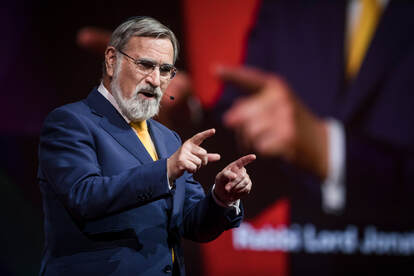- Home
- Process Worldview
- Community
- Art and Music
- Whitehead and Process Thinking
- Podcasts
- Spirituality
- Ecological Civilization
- Education
- Contact
- Social Justice
- Science
- Animals
- Sacred Poems
- Whitehead Videos
- Index of All Titles
- Practicing Process Thought
- Process Spirituality: A Spiritual Alphabet
- Recent Posts
Facing the Future without Fear
How we can face the future without fear, together
A TEDtalk by Rabbi Lord Jonathan Sacks
Quotes by Rabbi Jonathan Sacks:
Who is Rabbi Lord Jonathan Sacks?
 Photo: Ryan Lash (CC BY-NC2.0)
Photo: Ryan Lash (CC BY-NC2.0)
"An international religious leader, philosopher, award-winning author and respected moral voice, Rabbi Lord Jonathan Sacks was awarded the 2016 Templeton Prize in recognition of his “exceptional contributions to affirming life’s spiritual dimension.” Described by H.R.H. The Prince of Wales as “a light unto this nation” and by former British Prime Minister Tony Blair as “an intellectual giant”, Rabbi Sacks is a frequent and sought-after contributor to radio, television and the press both in Britain and around the world.
"Since stepping down as the Chief Rabbi of the United Hebrew Congregations of the Commonwealth – a position he served for 22 years between 1991 and 2013 – Rabbi Sacks has held a number of professorships at several academic institutions including Yeshiva University and King’s College London. In addition to his writing and lecturing, he currently serves as the Ingeborg and Ira Rennert Global Distinguished Professor at New York University. Rabbi Sacks has been awarded 17 honorary doctorates including a Doctor of Divinity conferred to mark his first ten years in office as Chief Rabbi, by the then Archbishop of Canterbury, Lord Carey."
From the website of Rabbi Lord Jonathan Sacks
"Since stepping down as the Chief Rabbi of the United Hebrew Congregations of the Commonwealth – a position he served for 22 years between 1991 and 2013 – Rabbi Sacks has held a number of professorships at several academic institutions including Yeshiva University and King’s College London. In addition to his writing and lecturing, he currently serves as the Ingeborg and Ira Rennert Global Distinguished Professor at New York University. Rabbi Sacks has been awarded 17 honorary doctorates including a Doctor of Divinity conferred to mark his first ten years in office as Chief Rabbi, by the then Archbishop of Canterbury, Lord Carey."
From the website of Rabbi Lord Jonathan Sacks
Fear, Change, and Our Community
A Reflection by Lexie Burleson

Lexie is a rising junior at Hendrix College in Conway, Arkansas. She has a vibrant interest in interfaith studies and is working this summer as an intern with The Greater Arkansas Interfaith Network and All Saints' Episcopal Church in Russellville, Arkansas.
On the last Friday evening of June, a group gathered at All Saints' Episcopal Church in Russellville to watch a short TED Talk by Rabbi Jonathan Sacks, which discussed the relationship between fear, change, and the uncertain future. I was privileged enough to develop the questions used for discussion and made an effort to tie them to a theme found in many faith traditions: welcoming the stranger. The stranger in this context can be seen as many people or groups and I found it interesting to consider the stranger as both those who are marginalized in society as well as those who hold different ideals and beliefs than my own. How do we welcome both, especially when those who do hold different beliefs may have no desire to welcome those who are marginalized?
Perhaps this can be achieved by recognizing and accepting our differences before we come to the table to discuss the state of our communities presently and the hopes we have for the future. The first step occurs on an individual level and has everything to do with the way we treat others. If we can unite in spite of our differences, we can focus on the common purpose we all share. For those in attendance during our discussion, there was a shared passion for the community of Russellville and, unfortunately, uncertainty regarding its current state after a hate group has made themselves well known this past year. What is the next step in creating a better community? If we want to live in a better neighborhood, we need to be better neighbors. Sacks says, “we all share collective responsibility for the collective future.” Complacency is no longer an option. It is time to actively cultivate the accepting and neighborly communities we want to be a part of. This includes denouncing bigotry and being intentional in creating diverse and welcoming groups that are able to stand together as we create a future where we all feel safe and validated.
If Sacks' TED Talk is boiled down to just one point, it would be that change is inevitable. Our “status quo” is not set in stone. Thankfully, we are able to control what does change through the way we build connections with others and stand with them against the atrocities that threaten the love and inclusion we hope to find in our communities. Our society is changing and many of us are in a position to push it towards the good and light our communities and its members deserve to live in. Truly, it seems we all felt the best way to welcome the stranger is to cultivate a community that can accept those who are different as well as overall change towards a more inclusive and accepting community through shared causes. Regardless of what change holds, be it loss of status or security, adversity, or pain, it also holds the possibility of becoming a stronger collective that is able to uplift and support members of the community. To achieve a future of compassion and servitude towards our neighbors, we must first welcome the stranger.
On the last Friday evening of June, a group gathered at All Saints' Episcopal Church in Russellville to watch a short TED Talk by Rabbi Jonathan Sacks, which discussed the relationship between fear, change, and the uncertain future. I was privileged enough to develop the questions used for discussion and made an effort to tie them to a theme found in many faith traditions: welcoming the stranger. The stranger in this context can be seen as many people or groups and I found it interesting to consider the stranger as both those who are marginalized in society as well as those who hold different ideals and beliefs than my own. How do we welcome both, especially when those who do hold different beliefs may have no desire to welcome those who are marginalized?
Perhaps this can be achieved by recognizing and accepting our differences before we come to the table to discuss the state of our communities presently and the hopes we have for the future. The first step occurs on an individual level and has everything to do with the way we treat others. If we can unite in spite of our differences, we can focus on the common purpose we all share. For those in attendance during our discussion, there was a shared passion for the community of Russellville and, unfortunately, uncertainty regarding its current state after a hate group has made themselves well known this past year. What is the next step in creating a better community? If we want to live in a better neighborhood, we need to be better neighbors. Sacks says, “we all share collective responsibility for the collective future.” Complacency is no longer an option. It is time to actively cultivate the accepting and neighborly communities we want to be a part of. This includes denouncing bigotry and being intentional in creating diverse and welcoming groups that are able to stand together as we create a future where we all feel safe and validated.
If Sacks' TED Talk is boiled down to just one point, it would be that change is inevitable. Our “status quo” is not set in stone. Thankfully, we are able to control what does change through the way we build connections with others and stand with them against the atrocities that threaten the love and inclusion we hope to find in our communities. Our society is changing and many of us are in a position to push it towards the good and light our communities and its members deserve to live in. Truly, it seems we all felt the best way to welcome the stranger is to cultivate a community that can accept those who are different as well as overall change towards a more inclusive and accepting community through shared causes. Regardless of what change holds, be it loss of status or security, adversity, or pain, it also holds the possibility of becoming a stronger collective that is able to uplift and support members of the community. To achieve a future of compassion and servitude towards our neighbors, we must first welcome the stranger.